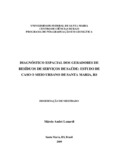| dc.creator | Lunardi, Márcio André | |
| dc.date.accessioned | 2014-10-01 | |
| dc.date.available | 2014-10-01 | |
| dc.date.issued | 2013-03-25 | |
| dc.identifier.citation | LUNARDI, Márcio André. DIAGNOSIS SPATIAL OF THE GENERATORS OF WASTE OF
HEALTH SERVICES: THE CASE STUDY OF URBAN AREA
SANTA MARIA, RS. 2013. 89 f. Dissertação (Mestrado em Geociências) - Universidade Federal de Santa Maria, Santa Maria, 2013. | por |
| dc.identifier.uri | http://repositorio.ufsm.br/handle/1/9588 | |
| dc.description.abstract | According to IBGE (2000), 2300 tons per day are generated in Brazil, and of these only 14%
of the waste properly treat municipal health services. Therefore, this study aimed to
georeferenced establishments that generate the waste of health services, using the techniques
of GIS to conduct spatial analysis of the generators in the city of Santa Maria. The specific
objectives guiding those responsible for the generation of special waste to follow the rules
confirmed the frequency of collections and checked the amount generated in the sampled
establishments. Served also for planning with solutions in the management of the RSS and the
RSS produced by quantifying the health units in the municipality. As this is a study on RSS,
used for this purpose the data from interviews of PNSB held between 1998 to 2000, and
research in 2008, started in October last year, both by the IBGE and the report of ANVISA
2006 for development of an instrument used in research establishments. The results verified
the concentration of private activities in the city center, and space units of the municipal
health districts of the city. As the frequency of collection was found to be weekly and
fortnightly as the most made at the findings. To address and improve the services of
collection, the adoption of agreements, or consortia, even in partnerships to ensure obtaining
the most advantageous to the health of the enterprise and the service provider. To address and
improve the services of collection, the adoption of agreements, or consortia, even in
partnerships to ensure best value to get the company to health and the service provider. | eng |
| dc.format | application/pdf | por |
| dc.language | por | por |
| dc.publisher | Universidade Federal de Santa Maria | por |
| dc.rights | Acesso Aberto | por |
| dc.subject | SIG | por |
| dc.subject | Resíduos de serviços de saúde | por |
| dc.subject | Meio urbano | por |
| dc.subject | GIS | eng |
| dc.subject | Waste services | eng |
| dc.subject | Urban | eng |
| dc.title | Diagnóstico espacial dos geradores de resíduos de
serviços de saúde: estudo de caso o meio urbano de
Santa Maria, RS | por |
| dc.title.alternative | Diagnosis spatial of the generators of waste of
health services: the case study of urban area
Santa Maria, RS | eng |
| dc.type | Dissertação | por |
| dc.description.resumo | De acordo com o IBGE (2000), 2300 toneladas diárias são geradas no Brasil, e destas apenas
14% dos municípios tratam adequadamente os resíduos de serviços de saúde. Portanto, este
trabalho teve por objetivo georreferenciar os estabelecimentos que geram os resíduos de
serviços de saúde - RSS, com uso das técnicas de geoprocessamento, para realizar a análise
espacial dos geradores no meio urbano de Santa Maria. Os objetivos específicos orientaram os
responsáveis pela geração dos resíduos especiais a seguirem as normativas, confirmaram a
periodicidade de coletas e verificaram a quantidade gerada nos estabelecimentos amostrados.
Serviram ainda para o planejamento com soluções viáveis no gerenciamento dos RSS e por
quantificar os RSS produzidos nas unidades de saúde do município. Como se trata de um
estudo sobre RSS, para esse fim usou-se os dados das entrevistas da PNSB, realizada entre
1998 a 2000, e da pesquisa de 2008, iniciada em outubro do ano passado, ambas pelo IBGE e
do relatório da ANVISA 2006, para elaboração de um instrumento de pesquisa aplicado nos
estabelecimentos. Os resultados verificaram a concentração de atividades privadas no centro
urbano, e a espacialização das unidades de saúde municipais pelos bairros da cidade. Quanto à
periodicidade de coleta foi encontrada a freqüência semanal e quinzenal como as mais
realizadas nos estabelecimentos apurados. Para solucionar e melhorar os serviços de coleta, a
adoção de convênios, ou consórcios, até mesmo nas parcerias visa garantir a obtenção mais
vantajosa para o empreendedor da área de saúde e para o prestador de serviço. | por |
| dc.contributor.advisor1 | Cassol, Roberto | |
| dc.contributor.advisor1Lattes | http://buscatextual.cnpq.br/buscatextual/visualizacv.do?id=K4787538A5 | por |
| dc.contributor.referee1 | Giotto, Enio | |
| dc.contributor.referee1Lattes | http://buscatextual.cnpq.br/buscatextual/visualizacv.do?id=K4783625T4 | por |
| dc.contributor.referee2 | Noguera, Jorge Orlando Cuéllar | |
| dc.contributor.referee2Lattes | http://buscatextual.cnpq.br/buscatextual/visualizacv.do?id=K4797742U6 | por |
| dc.creator.Lattes | http://lattes.cnpq.br/0691307965091897 | por |
| dc.publisher.country | BR | por |
| dc.publisher.department | Geociências | por |
| dc.publisher.initials | UFSM | por |
| dc.publisher.program | Programa de Pós-Graduação em Geomática | por |
| dc.subject.cnpq | CNPQ::CIENCIAS EXATAS E DA TERRA::GEOCIENCIAS | por |


